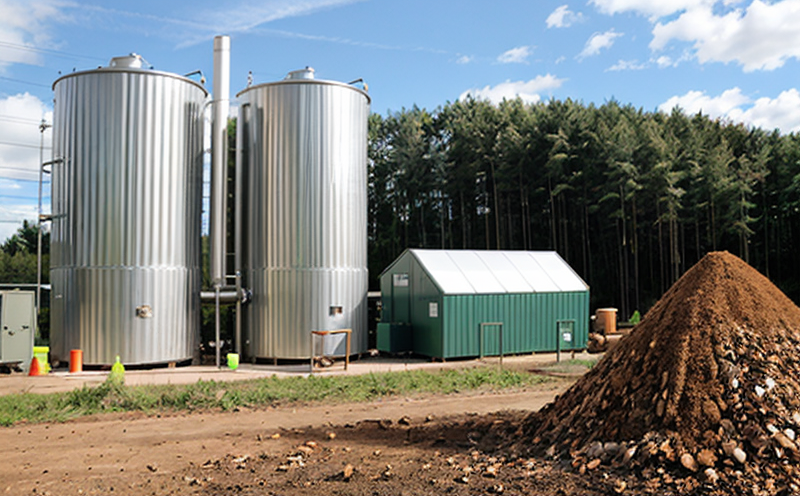ISO 23876 Thermal Decomposition of Biomass Waste
The ISO 23876 standard specifies a method for determining the thermal decomposition characteristics of biomass waste materials. This testing is essential in understanding how different types of biomass will behave under specific temperature conditions, which is critical for optimizing processes related to waste-to-energy conversion and biomass utilization.
Thermal decomposition involves the breakdown of complex organic compounds into simpler substances through heat application. In the context of ISO 23876, this process helps determine the stability and reactivity of biomass materials when subjected to elevated temperatures. This information is particularly valuable for industries involved in waste management and recycling as it aids in selecting appropriate technologies for efficient conversion processes.
The testing procedure outlined in ISO 23876 involves subjecting a sample of biomass material to controlled temperature changes over time, monitoring the mass loss and evolution gas composition during this process. The results provide insights into the thermal behavior of the biomass, including its ignition point, maximum degradation temperature, and residue yield.
Understanding these parameters is crucial for several reasons:
- Optimizing Waste-to-Energy Processes: By knowing how much energy can be extracted from a given type of biomass at specific temperatures, facilities can design more efficient waste-to-energy plants. This helps in reducing operational costs and improving overall efficiency.
- Selecting Suitable Biomass Sources: The test results enable companies to choose the most appropriate types of biomass for their operations, ensuring that they meet both quality standards and environmental regulations.
- Improving Material Stability: Knowledge gained from this testing can lead to better storage practices and handling protocols, extending the shelf life of biomass materials before they are used in conversion processes.
- Regulatory Compliance: Meeting specific thermal decomposition characteristics ensures adherence to local and international environmental standards, thereby reducing legal risks associated with non-compliance.
The testing process typically involves careful preparation of the sample. This may include drying the biomass at ambient temperature or under vacuum conditions, depending on the nature of the material being tested. Once prepared, the sample is placed into a furnace where it undergoes controlled heating until complete decomposition occurs. Throughout this process, various parameters such as temperature and time are meticulously recorded.
The equipment used for this testing includes furnaces capable of precise temperature control, gas analyzers to measure the composition of evolved gases, and mass balances to quantify any changes in weight. These instruments play a vital role in ensuring accurate data collection which forms the basis of reliable test results.
Why It Matters
The implementation of ISO 23876 thermal decomposition testing is not merely an academic exercise but has significant implications across various sectors. For instance, energy producers who rely heavily on biomass as a feedstock need accurate data about how their materials will behave under different temperature conditions to ensure optimal performance.
From the perspective of environmental protection, understanding these characteristics helps in designing more sustainable waste management strategies. By maximizing the recovery potential from waste streams, industries contribute positively towards reducing landfill usage and decreasing greenhouse gas emissions associated with traditional disposal methods.
In addition, research institutions engaged in biotechnology or renewable energy development benefit greatly from such tests as they pave the way for innovations that could revolutionize how we handle waste materials. The insights gained can lead to novel approaches in converting otherwise problematic substances into valuable resources.
Benefits
The benefits of conducting ISO 23876 thermal decomposition testing extend beyond immediate practical applications; they also contribute significantly towards long-term strategic goals within the waste management and recycling industries. One key benefit is enhanced operational efficiency, allowing organizations to fine-tune their processes for maximum output while minimizing resource consumption.
Another significant advantage lies in improved regulatory compliance which translates into reduced risk exposure for enterprises operating under stringent environmental legislation. Furthermore, this testing supports sustainable development initiatives by promoting circular economy principles through better utilization of waste resources.
For R&D teams involved in developing new technologies or products based on biomass feedstocks, the information obtained provides valuable input for innovation projects aimed at creating more efficient and eco-friendly solutions. Lastly, it fosters transparency between stakeholders by providing clear evidence supporting claims made regarding the properties of tested biomaterials.
Use Cases and Application Examples
Biomass waste conversion into energy is increasingly seen as a viable solution for addressing global challenges related to sustainable resource management. Here are some specific applications where ISO 23876 thermal decomposition testing plays a crucial role:
- Landfill Gas Recovery: Understanding the composition and stability of landfills allows for more efficient capture and utilization of methane-rich gases produced during decomposing organic matter.
- Biofuel Production: Identifying suitable feedstocks helps in optimizing fermentation processes leading to higher yields of bioethanol or biodiesel.
- Composting Operations: Ensuring proper decomposition temperatures prevents contamination issues and enhances the quality of compost produced.
- Incineration Plants: Optimizing combustion conditions ensures complete destruction of pollutants while maximizing heat recovery efficiency.
- Biochar Manufacturing: Characterizing raw materials improves product consistency and performance enhancing its potential as a soil amendment or carbon sequestration agent.
- Biorefineries: Selecting appropriate feedstocks based on thermal properties facilitates integration into existing refining infrastructures resulting in higher value-added products.
The results of these tests are instrumental in tailoring specific solutions tailored to individual operational needs. Whether it's improving process efficiency, ensuring compliance with environmental regulations, or advancing scientific knowledge, ISO 23876 thermal decomposition testing remains a cornerstone technology for anyone involved in biomass waste conversion projects.





